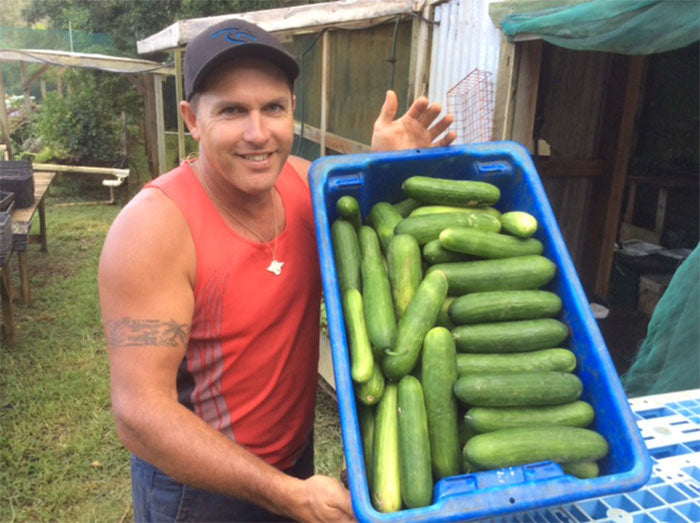Surviving a Plague – Matt's Solution
Matt Bigg has been a Nutrition Farmer since my first visit to Norfolk Island seven years ago. He immediately recognised the logic of solving problems, rather than the treatment of symptoms with chemicals. Matt also argues that vegetable growers should always be prepared to feed their produce to their own families. Unfortunately, this is not the case with many chemical farmers. They often have their own chemical-free garden to provide uncontaminated food to their loved ones.
Matt produces fifteen chemical-free vegetable crops and a dozen organic fruit crops, on two Norfolk farms. He has developed a reputation for fine-flavoured, biological produce and the customers line up at the local farmers’ market to reward his efforts.
Norfolk Island has recently been hit with a new insect pest. Psyllids had not previously reared their destructive little heads on the island. Then, about 12 months ago, a conventional tomato grower reported first contact with the invaders. Despite his attempts at chemical control, his tomato growing operation has now been seriously impacted. This insidious sap sucker has now made its way around most crops on the island. The local government is about to embark on an expensive eradication program that will envelop the island in toxic pesticides. It appears that the only growers who have escaped the plague have been those practising Nutrition Farming®, and Matt is the largest scale operator amongst the survivors. During my recent visit to Norfolk Island, I decided to visit Matt to investigate the dynamics of his resilience, in the face of this new challenge.

Best Year Ever
Matt was in good spirits when we met. He has found that his production continues to improve with this common sense, nutrition emphasis. “I just stick to the program and things keep getting better,” he reports. “This summer I have had the best yields of watermelons, rockmelons, cucumbers and tomatoes ever”.
I enquired about his nutrition program. “Basically, I just follow the Nutrition Farming® guidelines on your website and, apart from that, all crops get the same five things,” Matt explained, “they get Norfolk Gold™ underneath them each time, and then I alternate Triple Ten™ and Trio™ in my foliar program. Tri-Kelp™ and NTS Fast Fulvic™ are also included with every foliar.”
Norfolk Gold™ is a complete biological fertiliser in a compost base. We developed this living fertiliser after testing most food-producing soils on the island. We discovered five missing minerals in most soils and there is an emphasis upon these missing minerals in the Norfolk Gold™ formula. Triple Ten™ and Trio™, together, deliver complete foliar nutrition and they are the biggest selling NTS liquid fertilisers across the globe. Kelp and fulvic acid are biological essentials that promote plant growth, reproductive efficiency and resilience.
I asked Matt why he felt he had escaped the psyllids. There was no hesitation with his response. “It's always about plant health,” he explains. “The healthier the plant, the less the problems. I have one tiny strip beside my drive with a psyllid infestation. This strip has not been soil tested and corrected like the other blocks.”
Matt understands that nutrition is all about minerals and microbes, so I asked him about the microbial side of his program. “I used to brew Nutri-Life 4/20™ every month, but these days the soils are so active I only need to apply brews every few months. I can plough in an entire, spent broccoli crop and the crop has largely disappeared within two to three weeks. That's a sign of thriving soil life.”
There has been a team of agricultural scientists from Australia researching the new psyllid problem on Norfolk Island for some time. I enquired around the island and discovered that the researchers have recorded the highest pest pressure amongst chemical farmers with compromised soil life.

Matt Abandons Hydroponics
Part of Matt Bigg's multi-faceted operation involves two hydroponics sheds, where he grows tomatoes and cucumbers. He suffered recurring problems with whitefly recently and made the decision to abandon hydroponics and plant both crops in the field. He was delighted at the outcome. “I don't know why I didn't do it years ago,” he exclaims. “There is no power requirement, 80% less labour and much lower fertiliser costs, but the biggest thing was the plant health and pest pressure. I have had no further issues with whitefly, the yields are almost double and the fruit is 50% bigger.” Matt explains that the labour reduction and associated stress reduction was largely related to less management in pruning laterals and tying vine crops.
Matt's Guidelines for Nutrition Farming® Success
I asked Matt to share some advice for growers who are considering the adoption of Nutrition Farming®. Here are his four key guidelines:
-
Get a good soil test so you know what is happening in your soil. Matt explained that he has tested and corrected most of his soils and this is an essential component of precision nutrition and associated resilience.
-
Grow some cover crops and plough them in before you start, and whenever the opportunity presents. Matt explains, “Feeding your soil is such a basic idea. You look after your soils and they look after you.” He continues, “It is hard to understand why there are still growers who have not understood this concept. Once you are up and running, your spent vegetable crops are similar to cover crops when you return them to the soil. There is a lot of organic matter in a brassica crop, for example.”
-
Believe that it works. Matt believes that there are many growers who know they are doing the wrong thing, but do not believe there is a viable alternative. He states, “I have noticed that negative breeds negative and many growers could do so much better if they thought and acted positively. They genuinely believe that they are shackled to the chemical rig. You need to understand how soils and plants work and then the confidence flows. My advice for everyone is that they should attend the NTS four-day course.”
-
Stick to the program – proactivity is an integral part of Nutrition Farming®. It is not about waiting until you have a problem. It is much more effective to manage to avoid pests rather than hitting them with a big hammer when they show up. Matt clarifies, “There are generalised programs for certain crops, or you can get a soil test and follow the complete program. There is no point in cherry picking bits that might suit.”
-
Learn how to brew microbes. This can be daunting to some growers because it seems so different. However, Matt insists that brewing your own compost tea or specialist microbes, like Nutri-Life 4/20™, is one of the most productive and most cost-effective biological strategies. “It kickstarts the whole system, particularly if your soils are dead from chemical farming. I started by doing it every month and I alternated compost tea and 4/20. My soils are so active now I only need the occasional top up. My soil is fluffy now and it smells beautiful.”

Sign up to our e-newsletter to receive the latest articles, product updates and exclusive offers from NTS. Every new subscription receives a free digital copy of Graeme Sait's book, 'Nutrition Rules!'. CLICK HERE TO SUBSCRIBE
